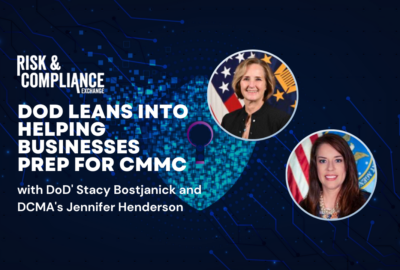How cost-reimbursement contracts can go haywire over time
A Navy contractor has a million-dollar dispute after waiting five years for the government to audit indirect costs.
Cost plus contracts can run into trouble when the government takes five years to audit indirect costs. That is what happened to a Navy contractor, and now it has a million-dollar dispute. They are now in court. For details, the Federal Drive with Tom Temin spoke with Haynes Boone procurement attorney Zach Prince.
Interview Transcript:
Eric White Cost-plus contracts can run into trouble when the government takes five years to audit indirect costs. That’s what happened to a Navy contractor and now it has a million dollar dispute. They’re in court over the details. And Federal Drive host Tom Temin discussed it with Haynes Boone procurement attorney Zach Prince.
Tom Temin And this all seems so routine, that you have a cost-plus contract, there’s direct costs, easy to bill indirect. Tell us what happened here and what the cautionary tale here is.
Zach Prince Sure, Tom. So, some background is probably helpful. I know this is an arcane area in government contracts, but when you’ve got a cost type contract, the basic idea is that your costs are reimbursed. You’ve got your actual cost experience, the government pays for that, with some caveats for the things the government decided they don’t pay for. And then on top of that, you’ve got a fee. It’s fixed typically in advance, because otherwise, there’s an incentive to run up the costs. And it should be fairly routine. You submit your invoices as you perform, for your direct costs. But every business is going to have indirect costs. That’s back office support, things that aren’t directly tied to one government contract, they support your whole operations. The way you get paid for those is you get paid based on a ratio that’s developed, a percentage that gets applied to your direct costs. As you go through things during your year performance, it’s an estimate, it’s provisional. You get it trued up at the end of a fiscal year. You send the government a proposal. The government’s supposed to audit it in a reasonable time or decide that they don’t need to audit it, come up with a final rate. And then you have a true up audit, invoice. You send an invoice to the government for more money if your rates are higher, or potentially you owe the government a credit if your rates are lower than you had assumed. The problem is, especially in the mid 2010s, the government had a massive backlog in these types of contracts where they’d have proposals that would sit there for years, where the defense contract audit agency did nothing until the very last minute when maybe they would disclaim the ability to do an audit for whatever reason. And then they throw it back over to DCMA, or the Navy or Army or whoever it is. And they would have to say, okay, what do we do with this now? Usually, this is years after a cost has been incurred. People who are there at the company at the time, aren’t there anymore to justify why they did cost X, Y or Z, and it creates these very messy disputes. Most of the time, it hasn’t mattered to the government. I mean, Congress has gotten involved and has put a lot of pressure that has gotten things a little better. But, practically, day to day administration, if the government takes five years, it just means they’re in a better position to challenge you. Because you have the burden of establishing that your costs are reasonable. The government doesn’t. So now, the government’s in a position where they can say, forget about it, you can’t get these costs back and you don’t have a lot of recourse.
Tom Temin Don’t contractors calculate those costs on a government-approved accounting system? And keep the records so that you can kind of just spit up the answer?
Zach Prince Yeah, they do, but there’s a lot of flexibility there. And, you know, the nature of what it means to have an approved accounting system is somewhat of a matter of dispute. This case is a good example of it, because in this case, in the Court of Federal Claims, is company reliability and performance technologies, had two DCAA audits saying their accounting systems were approved. And then still a couple years down the road DCAA said we can’t audit your incurred cost proposals because your accounting system was insufficient. It begs the question, what did they audit? And what was their conclusion?
Tom Temin All right. So what happened then, when the government denied these? In other words, five years later, the government said these costs are not proper, and a million dollars of adjustment for the contractor didn’t get paid. We’re speaking with Zach Prince. He’s a partner at the law firm Haynes Boone. So, then the contractor took them to court, and then what happened?
Zach Prince So what’s frustrating about this case is actually the government didn’t say the costs were improper. The government said the costs were allowable, that is they complied with the accounting system requirements. They didn’t get rid of any of their costs on the basis of the government’s arcane rules. They just said after five years, you, contractor, can’t get this money back now because of the cost ceilings that are in these contracts. There wasn’t enough money allocated to the contracts during performance. You’re supposed to be telling the government regularly, you know, we’re at 75% of what’s been set aside for funding for this contract, you need to set more money. It’s hard to do that with indirects. But the government said this is going to prevent you from recovering. They brought up what I think is a really interesting argument that I’ve seen raised before but not necessarily prevail yet, although I really think it should and it might here, that the government can’t use the funding limitations as a basis to refuse to pay the contractor amounts that are owed because the government breached the contract first in two ways, both of which are stemming to back down to their obligation to do an audit and true up of your indirect costs in a timely fashion. That is not five or six years later, within a couple of months, maybe a couple years at most. And that the government has an obligation to true up the provisional rates in a meaningful way, during performance. So you can’t just have the same provisional rates from year one to year five. They should be adjusted so that the government doesn’t have a situation where they’ve paid you too much or too little. And then you have to do this true up process later. It should be a fairly routine administrative process. It often doesn’t happen that way.
Tom Temin And the court decided in favor of the contractor but you’re writing that it’s not necessarily the answer to the bigger question.
Zach Prince They decided that way for now. So it’s a summary judgment decision, which means that the government made the argument that there are no facts that could be construed against it, essentially, if it went to trial, that would entitle the contractor to judgment. So the court said no, no, based on what we’ve seen here, there’s enough facts to establish that you, government, breached this contract in a couple of ways. And that you can’t prevent the contractor, or maybe won’t be able to prevent the contractor from recovering, based on these limitations of fund restrictions. Whether the court gets there in the end in a decision on the merits, it’s an open question. I kind of doubt they’re gonna get to a decision on the merits.
Tom Temin What do you think will happen instead?
Zach Prince I think they’re gonna settle this. I mean, if I were advising the government, or the contractor, I’d say, we’re talking about a million bucks, not a lot of money. Litigation is expensive, and it’s time consuming. And it’s clear that the court has an interest in ruling in the contractor’s favor here, or at least acknowledging the equities that lie in favor of the contractor. You come to the table, you throw some numbers around, and you walk away.
Tom Temin Yeah, I mean, the government, the Navy will rebaseline a program to the tune of a billion dollars. You know, 1/1000 of that, they need to be able to find for a contractor when the government was, in effect, this is not the legal term, but negligent, in how it handled indirect costs.
Zach Prince Yeah, that’s right. And the government doesn’t dispute that these are amounts that are allowable, and that otherwise should be reimbursed to the contractor. So in all fairness, it’s not like the contractor is trying to get one over on the government, the government doesn’t suggest otherwise. It’s just relying on this technicality, that I think is a stretch anyway. It doesn’t want a bad decision out there for itself later, which this I think could result in. It really ought to be coming to the table, which is unfortunate for the contractor community, honestly, because I’d like to see a decision on the merits in favor of the contractor here so that we can point to it in the future.
Tom Temin So what can contractors maybe do to prevent this from happening? And what could the government maybe do better?
Zach Prince So from the contractor side, I mean, they’ve got to be proactive. When they’ve got their incurred cost proposal sitting out there for years, contact your contracting officer. Do it regularly, or your administrative contracting officer, and say, you know, this is sitting out there, and we are having trouble figuring out our firm responsibilities when we don’t know what the rates are, and we need help. They also could do a better job of telling the government, hey, we need our rates, that are being used on a provisional basis for billing, to reflect reality, so that nobody is left holding the bag down the road. On the government side, you’ve got to do a better job of administration. It’s not just the Navy. It’s everyone in DoD, and certainly everyone’s civilian agencies. I’m seeing, and have been for years, rates getting trued up the very end of the six year statute limitations of the window when you have to challenge anything. And that’s because of their pressures internally, and there’s backlogs and I totally get it. But you can’t let it sit that long, because you’ll never be able to figure out these disputes if you wait that long
Eric White Procurement attorney Zach Prince is a partner at Haynes Boone speaking there with Federal Drive host Tom Temin. We’ll post this interview at federalnewsnetwork.com/federaldrive. Subscribe to The Federal Drive wherever you get your podcasts.
Copyright © 2024 Federal News Network. All rights reserved. This website is not intended for users located within the European Economic Area.
Tom Temin is host of the Federal Drive and has been providing insight on federal technology and management issues for more than 30 years.
Follow @tteminWFED






